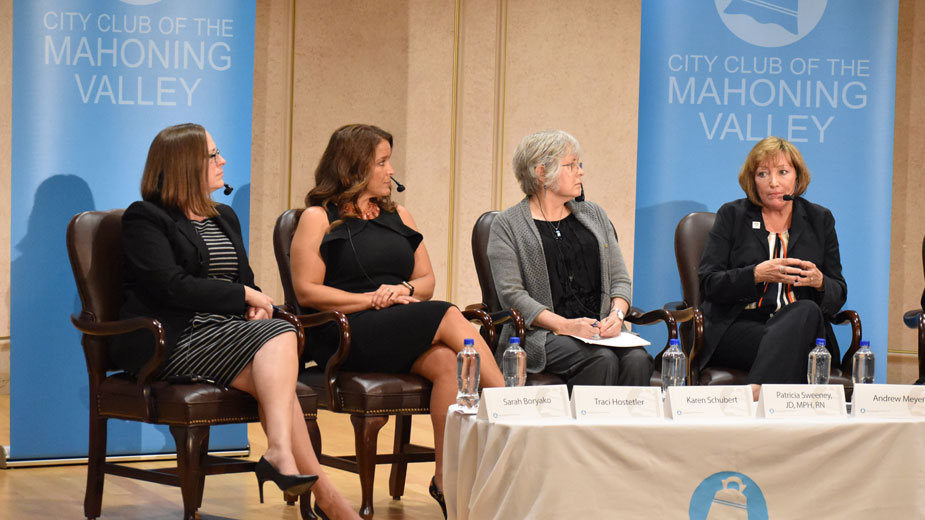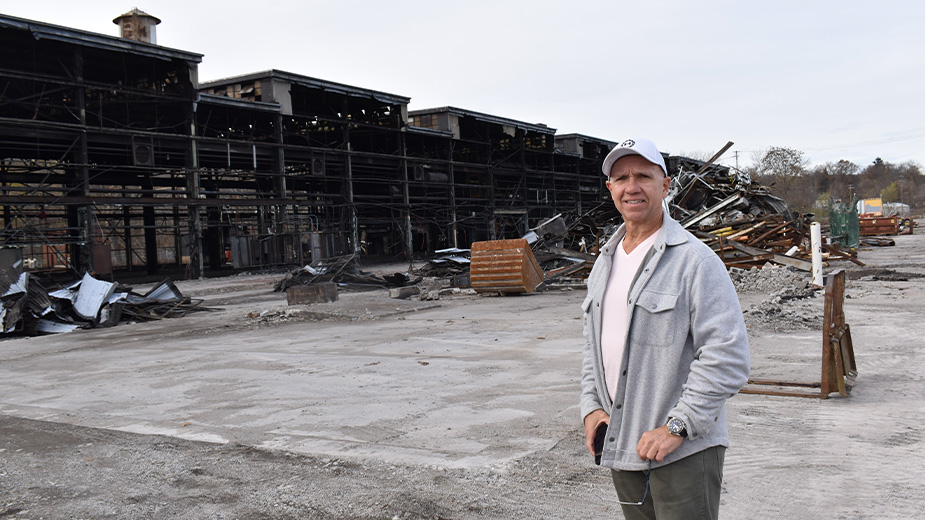City Club Panel Links Health, Arts to Economic Development
YOUNGSTOWN, Ohio – The fate of the General Motors Lordstown Complex and its workers, preparing and connecting workers with job opportunities, and how health-care impacts education and workforce were among the topics discussed by in the City Club of the Mahoning Valley’s second annual State of the Valley discussion.
When regional growth and development are discussed, the conversation often focuses on issues such as job creation, talent attraction and investment, said Lauren Johnson, the U.S. Route 422 Corridor and business development manager at the Youngstown/Warren Regional Chamber.
“While these factors are important, we can’t underestimate the critical role education, arts and culture, health care and politics play in shaping a region’s population density and growth,” she said.
Panelists included Sarah Boyarko, chief operating officer of the chamber; Traci Hostetler, superintendent of the Mahoning County Educational Service Center; Karen Schubert, president of Lit Youngstown; and Patricia Sweeney, health commissioner of the Mahoning County District Board of Health.
The chamber is managing “a very promising and very active pipeline” of potential projects worth more than $1.5 billion – industrial projects mostly – that could be announced in the next 12 to 24 months, Boyarko said. So far this year, more than $200 million worth of projects have been announced.
When she first started her career in economic development, Boyarko recalled, workforce needs were listed among the top five or 10 concerns for companies. But over the past few years, “It’s always No. 1,” she said. Businesses need to be vocal about what their needs are today as well as where they see their industries headed in the future.
The Mahoning County Educational Service Center is “future focused,” working with an array of local partners “to enlighten students and connect them with opportunities and to guide them into careers that we don’t even know exist,” Hostetler said.
The agency collaborates with a business advisory council that works with higher education, the Mahoning Valley Manufacturers Coalition and the skilled trades and labor unions, Hostetler said. This summer, the council is transporting kids from school districts to Mahoning County businesses, ranging from manufacturers to restaurants to car dealerships, to expose them to the wide range of jobs each offers.
-“Our goal is to get them to see every aspect of any entity that would take us in,” Hostetler said. At a steel mill, for example, the students would not only see individuals working directly in the steelmaking process but working in offices in secretarial and management positions.
Boyarko acknowledged that economic development professionals “cannot hide from” or fail to acknowledge the challenges faced by the local auto industry and its supply chain. While Cincinnati-based Workhorse Group Inc. has been announced as a potential buyer for the GM plant, she acknowledged the company would use just a portion of the plant.
“There are a variety of options we are keeping an eye on should that not pan out,” she said.
The chamber partnered with employers to present job opportunities for idled autoworkers and supply chain companies, most recently workers idled by the abrupt closing of Falcon Transport Co., who were “scooped up pretty quickly” by other firms.
Collectively, she added, the business community, support services and economic development professionals have done a good job over the years of assisting companies with diversifying their business. As a result, many companies that might have closed because of the GM Lordstown shutdown have remained open, she said.
“In a community with so much humanitarian need, it’s really important not to not to see the arts as a luxury,” Schubert, from Lit Youngtown, argued. In addition to arts improving critical thinking and promoting healing, the creative industries generate half a billion dollars in economic impact, she said.
One of the most resounding issues identified in the Mahoning County health needs assessment is mental health, Sweeney said. According to the assessment, 34% of respondents said they were unable to care for themselves or go to work because of depression, anxiety or another significant mental health issue. If someone is feeling that poorly, it doesn’t matter what jobs are available, she said.
Similarly, children coming to school amid issues of anxiety and depression “doesn’t lend well to that learning and eventually being employable,” Hostetler said.
Health outcomes are 40% related to social conditions, 30% to behavior, 20% access to health care and 10% physical environment, Sweeney reported. If economic conditions, education, job opportunities and housing “are not up to par, then our health is not up to par,” she said.
“Certainly, we see that in education,” Hostetler affirmed.
Many students who might qualify for free meals don’t sign up for them. “We know there are kids who are more interested in skipping breakfast or lunch than being perceived as the poor kids who don’t have food.”
Those kids then aren’t ready to learn because they’re tired and their brains aren’t developing, she continued. “I’m not a medical professional, but I know your body needs to be nourished,” she said.
Funding in the state education bill, if approved, would provide more than $5 million designated for mental health services for Mahoning County schools, she said. The educational service center is working with school districts, school mental health professionals, superintendents and principals to determine what services kids need so they can be properly served.
“It’s a good start,” Hostetler said. “I’m really happy we’re finally taking notice there is some significant, developmental base issues that are holding kids back from what they could be.”
Schubert said the arts is “really one of the strengths of life” locally.
“I would like the community to see arts as a vehicle for the goals that we share,” Schubert said. She pointed to various ways the arts serve the community, including an art therapy program at Akron Children’s Hospital Mahoning Valley.
She also discussed a pair of upcoming initiatives. The Community Foundation of the Mahoning Valley is funding the Where Sidewalks End art show, which is intended to identify local gaps in infrastructure. The National Endowment for the Arts recently awarded Lit Youngstown and the Public Library of Youngstown & Mahoning County a $15,000 grant to promote the reading of Luis Alberto Urrea’s “Into the Beautiful North” and have a “community conversation” about the issues in the book.
Sweeney pointed out that everyone is responsible for decisions about community health, regardless of what they do in their walk of life. The current generation is the first that is not expected to have the same life expectancy as their parents.
Decades of decisions driven by profit and “speed of the cars heading down the street … has put us where we are,” Sweeney said. “And until we all recognize that we have a responsibility for those policies and change those policies, we’re not going to get out of here.”
She pointed to her own efforts to convince her daughter – Alexa Sweeney Blackann, vice president of Sweeney Chevrolet Buick GMC in Boardman – to put a sidewalk in front of the new dealership building under construction on Market Street to encourage other businesses to do the same, to improve pedestrian access.
“That’s the way you have to start thinking,” she said.
Pictured: Panelists at the City of Club of the Mahoning Valley’s ‘State of the Valley’ discussion were Sarah Boyarko, Traci Hotstetler, Karen Schubert and Patricia Sweeney.
Copyright 2024 The Business Journal, Youngstown, Ohio.



